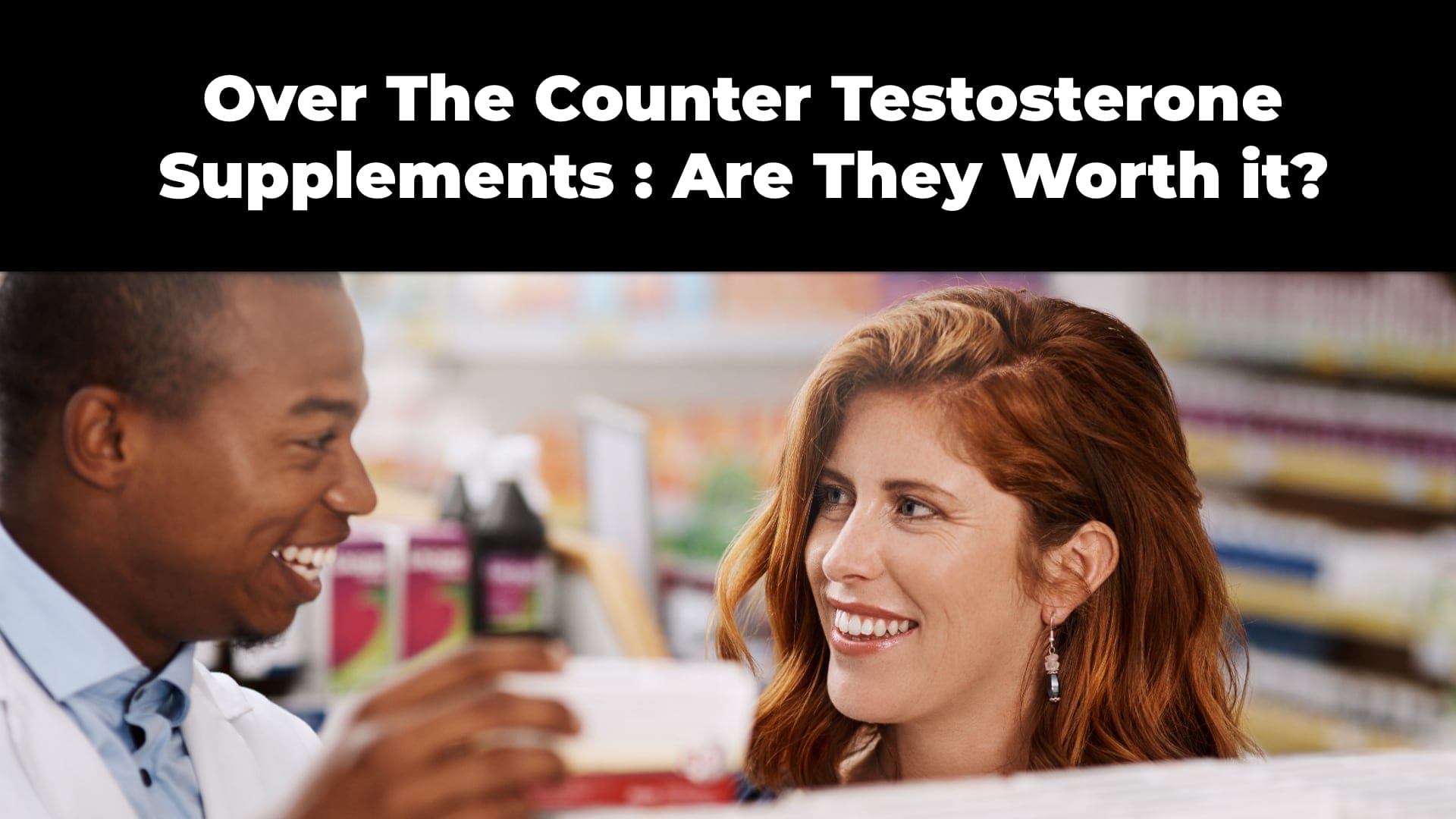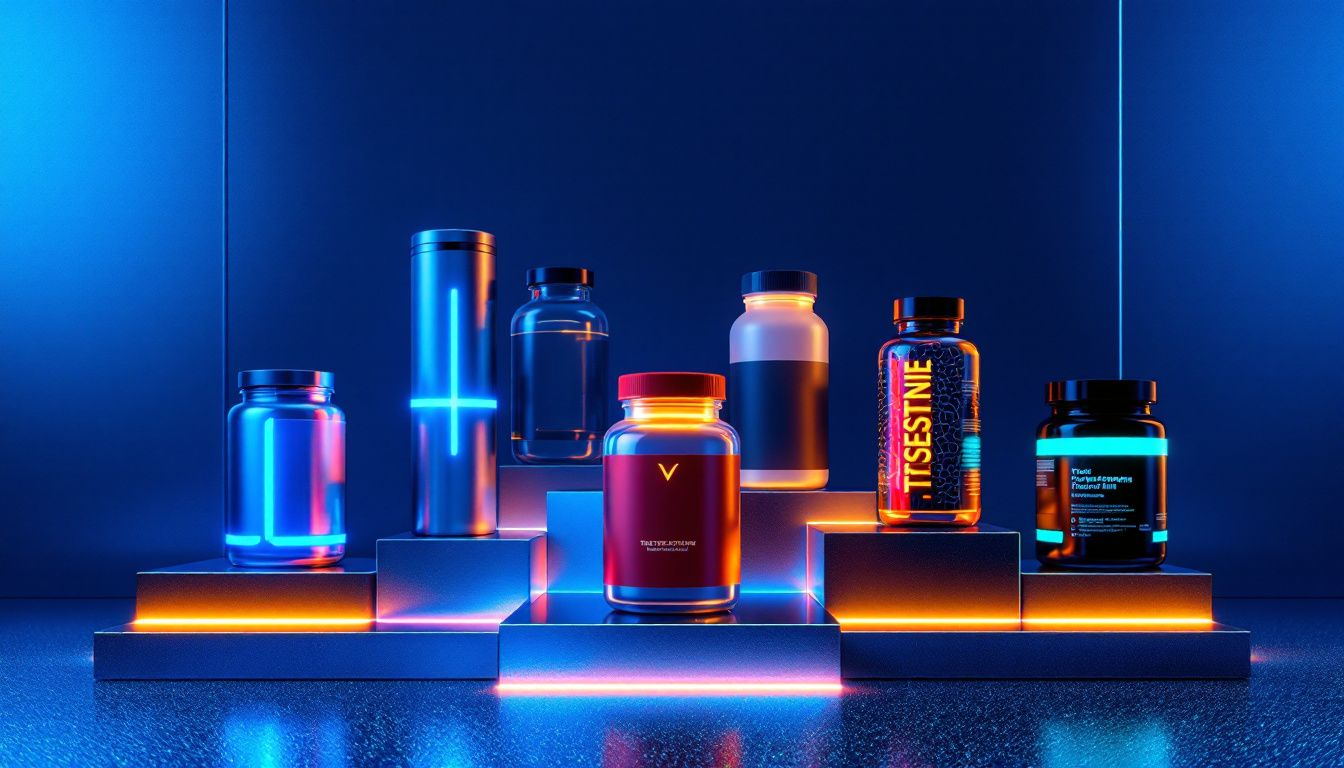
Looking into testosterone OTC supplements? This article explains what these products are, how they work, their ingredients, and the scientific evidence behind their claimed benefits and risks.

Testosterone OTC products, available as dietary supplements, aim to enhance testosterone production and related male sex hormone. Marketed towards men with low testosterone, they promise increased energy, muscle mass, and sexual drive.
Common types of testosterone OTC products include herbal supplements, which often incorporate ingredients like Tongkat Ali, fenugreek extract, and DHEA. These ingredients are selected for their potential to support testosterone production and overall men’s health. Unlike prescription testosterone therapies, these supplements are not regulated by the FDA, raising concerns about their quality and efficacy.
Despite being unregulated, these supplements attract users due to their natural makeup and promises of youthful vigor. Understanding the ingredients and their claimed mechanisms is crucial.
Testosterone supplements often contain various ingredients, each aiming to boost levels through different mechanisms. For example, Tongkat Ali, known for its aphrodisiac properties, is included in about 15.6% of these products and shows potential in raising testosterone levels.
Fenugreek extract is another prevalent ingredient, present in nearly half of the surveyed testosterone supplements. It’s often claimed to enhance libido and support healthy testosterone levels. Users seeking to boost testosterone production naturally are drawn to fenugreek for its reputed benefits.
D-Aspartic acid, found in roughly 20% of testosterone supplements, is an amino acid that may increase testosterone levels by aiding the synthesis of luteinizing hormone, which stimulates testosterone production in the testes.
Additionally, certain vitamins and minerals like zinc and magnesium play crucial roles in testosterone production. Zinc is found in around 64.4% of testosterone supplements and is essential for testosterone synthesis in the body. Moreover, vitamin D supplementation has been linked to notable increases in testosterone levels, supporting overall men’s health.
With a better grasp of the key ingredients, it’s time to understand how these components work together to potentially elevate testosterone levels.
Testosterone boosting supplements claim to enhance testosterone levels by several mechanisms. One common method is increasing luteinizing hormone, which directly stimulates the testes to produce more testosterone. This hormone plays a critical role in the body’s natural testosterone production process.
Many of these supplements provide essential nutrients that are vital for testosterone synthesis. Zinc, for example, is crucial for testosterone production and is a common ingredient in these products. Similarly, vitamin B6, found in about 44.4% of testosterone supplements, supports various metabolic processes relevant to testosterone synthesis.
Manufacturers also claim that these supplements can boost free testosterone levels, help testosterone production, and prevent the breakdown of testosterone. Magnesium, included in 37.8% of testosterone boosters, is known to play a role in testosterone regulation and may help maintain optimal levels. These combined ingredients work together to naturally elevate testosterone levels.
Understanding how these supplements function leads us to examine the clinical evidence supporting their effectiveness.

The scientific community has scrutinized the effectiveness of testosterone supplements, and the results are mixed. Research indicates that only a small percentage of these products have credible evidence supporting their ability to raise testosterone levels. Many over-the-counter products often lack solid scientific backing, casting doubt on their efficacy.
For example, Tongkat Ali extract has shown potential in clinical trials to increase testosterone levels, while other natural supplements like DHEA and ashwagandha have shown mixed results.
Despite the claims, common ingredients in testosterone boosters have not demonstrated significant efficacy in improving testosterone levels. This lack of solid evidence means consumers should approach these products with a healthy dose of skepticism.
With the clinical evidence in mind, let’s explore the potential benefits that users might experience from testosterone OTC supplements.

Testosterone supplements and testosterone booster are often marketed with promising benefits, aiming to enhance muscle growth, improve sexual desire, and elevate energy levels. Many users report improvements in their overall well-being, citing higher sexual drive, more energy, bigger muscles, and better mood as some of the advantages.
Users also report positive changes in mental health and sleep patterns, such as deeper sleep and improved mood, although it’s wise to weigh these claims against available evidence.
Even though the potential benefits are appealing, considering the associated risks and side effects before starting any testosterone supplement is essential.

Despite their potential benefits, testosterone supplements come with a range of risks and side effects. A major concern is the heightened risk of cardiovascular issues, including heart attacks and strokes. Additionally, these supplements may cause mood swings, irritability, and increased aggression, affecting daily life.
Liver damage is another potential risk, with symptoms like abdominal pain and jaundice indicating severe complications. Moreover, testosterone deficiency supplementation may impair blood sugar levels, necessitating monitoring for individuals with diabetes. Some users have also reported experiencing sleep apnea, characterized by loud snoring and daytime fatigue.
Many testosterone supplements contain high doses of vitamins and minerals, which may exceed recommended limits and pose health risks. Weighing these dangers against the benefits is crucial before use.
After discussing risks, it’s important to compare OTC testosterone boosters with prescription testosterone therapy to understand their differences.
Prescription testosterone therapy is regulated by healthcare professionals and is backed by FDA approval, ensuring quality and safety. In contrast, herbal testosterone replacement therapy options may not have the same level of oversight.

Low testosterone, or the inability to produce adequate testosterone, can greatly impact physical and mental health. Conditions like hypogonadism affect:
Testosterone levels naturally decrease with age, leading to decreased testosterone levels in some individuals. Those with low testosterone from medical conditions or transgender individuals in transition might consider supplements. There’s also rising interest among aging males and those with lifestyle-induced low testosterone and testosterone level concerns.
Consulting a healthcare provider before starting testosterone supplements is advisable, especially if experiencing symptoms of low testosterone.
Understanding who might benefit, it’s important to know how to choose a quality testosterone OTC supplement.
Choosing a quality testosterone supplement involves careful consideration. Consulting a doctor if experiencing low testosterone symptoms is crucial, as they can provide guidance and recommend suitable treatments.
Carefully scrutinize the ingredient list to ensure quality and safety. Look for well-researched ingredients like Tongkat Ali, fenugreek extract, and D-Aspartic acid. Ensure the product is made by a reputable company and check for third-party testing for purity and potency.
By following these guidelines, you can choose a testosterone supplement that aligns with your health goals and provides the best chance of achieving the desired results.
Navigating the world of testosterone OTC supplements can be challenging, but understanding their ingredients, mechanisms, and potential benefits and risks is crucial. While these supplements promise to boost testosterone levels and improve overall well-being, it’s essential to approach them with caution and informed judgment.
By consulting healthcare providers, scrutinizing ingredient lists, and considering both the benefits and risks, you can make an informed decision about whether testosterone OTC products are worth incorporating into your health regimen. Remember, maintaining a healthy lifestyle is key to achieving and sustaining healthy testosterone levels.
Testosterone OTC products are natural supplements aimed at boosting testosterone levels and are available over-the-counter without the need for a prescription. These products typically contain ingredients that may support hormone production in the body.
Common ingredients in testosterone OTC supplements typically include Tongkat Ali, fenugreek extract, D-Aspartic acid, zinc, magnesium, and vitamin D, which are all thought to aid in testosterone production.
Testosterone OTC supplements are generally not effective, as only a small percentage have credible evidence demonstrating their ability to raise testosterone levels. It is advisable to consult with a healthcare professional before considering such supplements.
Using testosterone OTC supplements poses significant risks such as cardiovascular issues, mood swings, liver damage, and impaired blood sugar levels. It is crucial to approach these supplements with caution due to their potential health hazards.
OTC testosterone boosters are generally less regulated than prescription testosterone therapy, which is closely monitored by healthcare professionals for safety and efficacy. Therefore, opting for prescription therapy is advisable for reliable results.
Copyright 2026 Tongkat Ali Australia, all rights reserved